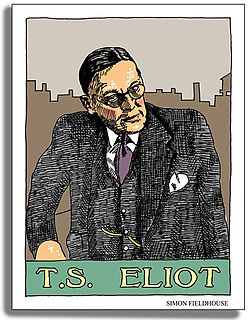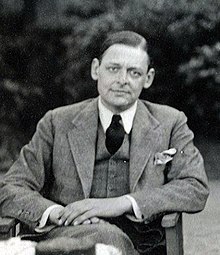T. S. Eliot
| Iste articlo ye en proceso de cambio enta la ortografía oficial de Biquipedia (la Ortografía de l'aragonés de l'Academia Aragonesa d'a Luenga). Puez aduyar a completar este proceso revisando l'articlo, fendo-ie los cambios ortograficos necesarios y sacando dimpués ista plantilla. |
| T. S. Eliot | |
|---|---|
 T. S. Eliot. | |
| Información personal | |
| Calendata de naixencia | 26 de setiembre de 1888 |
| Puesto de naixencia | |
| Calendata de muerte | 4 de chinero de 1965 |
| Puesto de muerte | |
| Ocupación | Escritor, poeta y dramaturgo |
Thomas Stearns Eliot, conoixiu como T. S. Eliot, (Saint Louis, Missouri, Estaus Unius; 26 de setiembre de 1888 - † Londres, Reino Uniu; 4 de chinero de 1965) estió un escritor, poeta y dramaturgo estausunidense (encara que nacionalizato bitanico), que recibió por a suya obra o Premio Nobel de Literatura en 1948.[1]

Obras
editarPoesía
editar- 1917: Prufrock and Other Observations.
- 1920: Poems.
- 1922: The Waste Land.
- 1925: The Hollow Men.
- 1927-1954: Ariel poems.
- 1930: Ash Wednesday.
- 1931: Coriolan.
- 1939: Old Possum's Book of Practical Cats.
- 1939: "The Marching Song of the Pollicle Dogs" y "Billy M'Caw: The Remarkable Parrot", en a obra compartita The Queen's Book of the Red Cross.
- 1945: Four Quartets.
Teatro
editar- 1926: Sweeney Agonistes.
- 1934: The Rock.
- 1935: Murder in the Cathedral.
- 1939: The Family Reunion.
- 1949: The Cocktail Party.
- 1954: The Confidential Clerk.
- 1959: The Elder Statesman.
Ensayo
editar- 1920: The Sacred Wood: Essays on Poetry and Criticism.
- 1920: The Second-Order Mind.
- 1920: Tradition and the individual talent.
- 1924: Homage to John Dryden.
- 1928: Shakespeare and the Stoicism of Seneca.
- 1928: For Lancelot Andrewes.
- 1929: Dante.
- 1917-1932: Selected Essays.
- 1933: The Use of Poetry and the Use of Criticism.
- 1934: After Strange Gods.
- 1934: Elizabethan Essays.
- 1936: Essays Ancient and Modern.
- 1940: The Idea of a Christian Society.
- 1948: Notes Towards the Definition of Culture.
- 1951: Poetry and Drama.
- 1954: The Three Voices of Poetry.
- 1957: On Poetry and Poets.
Referencias
editarVinclos externos
editar- Se veigan as imáchens de Commons sobre T. S. Eliot.
| Predecesor: André Gide |
Premio Nobel de Literatura 1948 |
Succesor: William Faulkner |